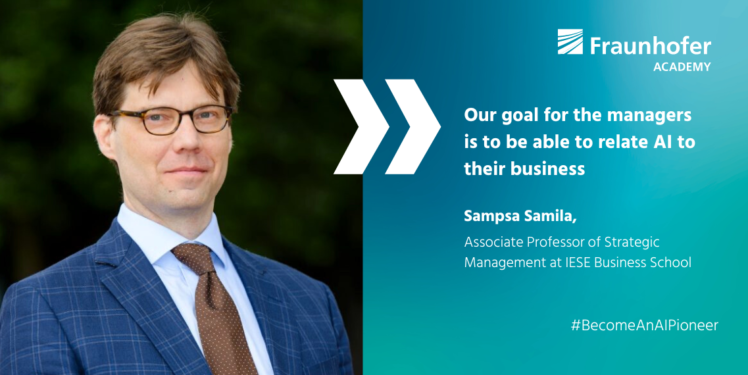Artificial intelligence (AI) has the potential to disrupt existing business models, but also to develop new, lucrative approaches. The key factors here are the mindset and knowledge of the management level. Today, they no longer have to deal with the question of whether AI will change the economy and society, but how. Sampsa Samila, Associate Professor of Strategic Management at IESE Business School, explains how managers can acquire the necessary vocabulary and know-how to talk – and think – about AI to develop successful plans. In collaboration with the Fraunhofer Academy, he offers the executive education programme „The Power of AI to Transforming Your Business“.
Prof. Samila, what is the role of continuing education in successful transformation through AI?
Artificial intelligence and all digital technologies in general can be immensely productivity enhancing. However, the productivity growth in Europe has been lagging compared to North America – and studies have basically attributed a lot of that to management. That means it is fundamentally a managerial task to drive AI forward – thinking about what their business is about, how they create value, how they organize their company, and what kind of technology they need to do that. Education plays an important part in helping managers to understand what the technical and economic properties of AI and related technologies are and then giving them tools. It is about helping them to understand AI and think differently about AI and their business.
What are the biggest challenges for managers?
The first challenge is that managers don’t necessarily have a clear understanding what artificial intelligence is, which makes it hard to develop serious business which make use of it. Second, the difficulty of having a language to talk about it. But the biggest challenges based on our research is trying to map out what kind of business models make sense, and where the individual value of AI lies. And of course, the transformation process itself is a really challenging issue, too.
To what extent are you putting AI led transformation into practice – for example in the seminar “The Power of AI to Transforming your Business“?
We designed the seminar explicitly with the objective to achieve that transformation in the manager’s thinking and them being able to start the transformation process. So, the key point of the program is to create the language and the mindset and the ability to think about the technology. Our goal for the managers is to develop the terminology, the language and understanding, to be able to talk to programmers and other experts, and then on the other side, to be able to relate AI to their business. We divide the course into five core topics: We start with an introduction of the technology, the second is about understanding the business and strategy implications. Third we start thinking: What do applications look like? What does it mean to you? And what do you need to build an AI application? After that we focus on how managers can build the necessary capabilities in their companies. And the final part is discussing how the transformation itself can be organized and led within the organization.
What does the implementation of AI currently look like in companies, and what are the biggest roadblocks?
It’s too slow. There is a notable hesitation because AI is perceived as a black box. We hope that by education companies would hesitate less to get started, would make wiser choices, and experience less trial and error when they start.
How should AI be implemented instead?
Every company’s experience is a little different, but there are general stages of the development: starting with pilot projects, checking out what works. Second, it would be building an AI hub – a kind of an internal AI unit – for developing their capabilities and also for hiring or partnerships. The stage after that is to build a platform that the business units can take advantage of. And finally, what the most advanced companies do – which are very few at this point – is embedding AI fully decentralized as a core part of every business unit.
Which kind of business models could be realized by using AI?
One thing is for instance personalization, analyzing the data of individual users or individual customers to design highly individualized services and products. Second is improving speed and efficiency: We have a considerable number of examples from industrial automation to industrial process control to even quality control. Number three is being able to innovate better products using the data and simulation tools. And then, of course, there’s an economic benefit in automation because with some tasks, it’s simply not economical to do them manually. This is not about replacement, but about tasks that we have not been doing at all because they are too expensive.
Our expert

Sampsa Samila
Associate Professor of Strategic Management at IESE Business School
Jutta Haubenreich ist seit 2009 in wechselnden Rollen bei Fraunhofer Academy tätig. Sie war u.a. für das übergreifende Marketing der Fraunhofer Academy und für die Betreuung und Vermarktung von Fraunhofer-Weiterbildungsprogrammen im Bereich Energie und Nachhaltigkeit zuständig. Aktuell betreut sie insbesondere die Fraunhofer Wasserstoff Education Community. Von 2011 bis 2017 war sie Projektleiterin und Koordinatorin des BMBF-Verbundprojektes »mint.online: Berufsbegleitende Studienangebote in MINT-Fächern«.
Von 2015 bis 2022 promovierte sie berufsbegleitend am Institut für Kommunikationswissenschaft und Medienforschung der LMU München zum Thema »Der Einfluss des Fernsehens auf Bildungsmotivation und -entscheidung«.


